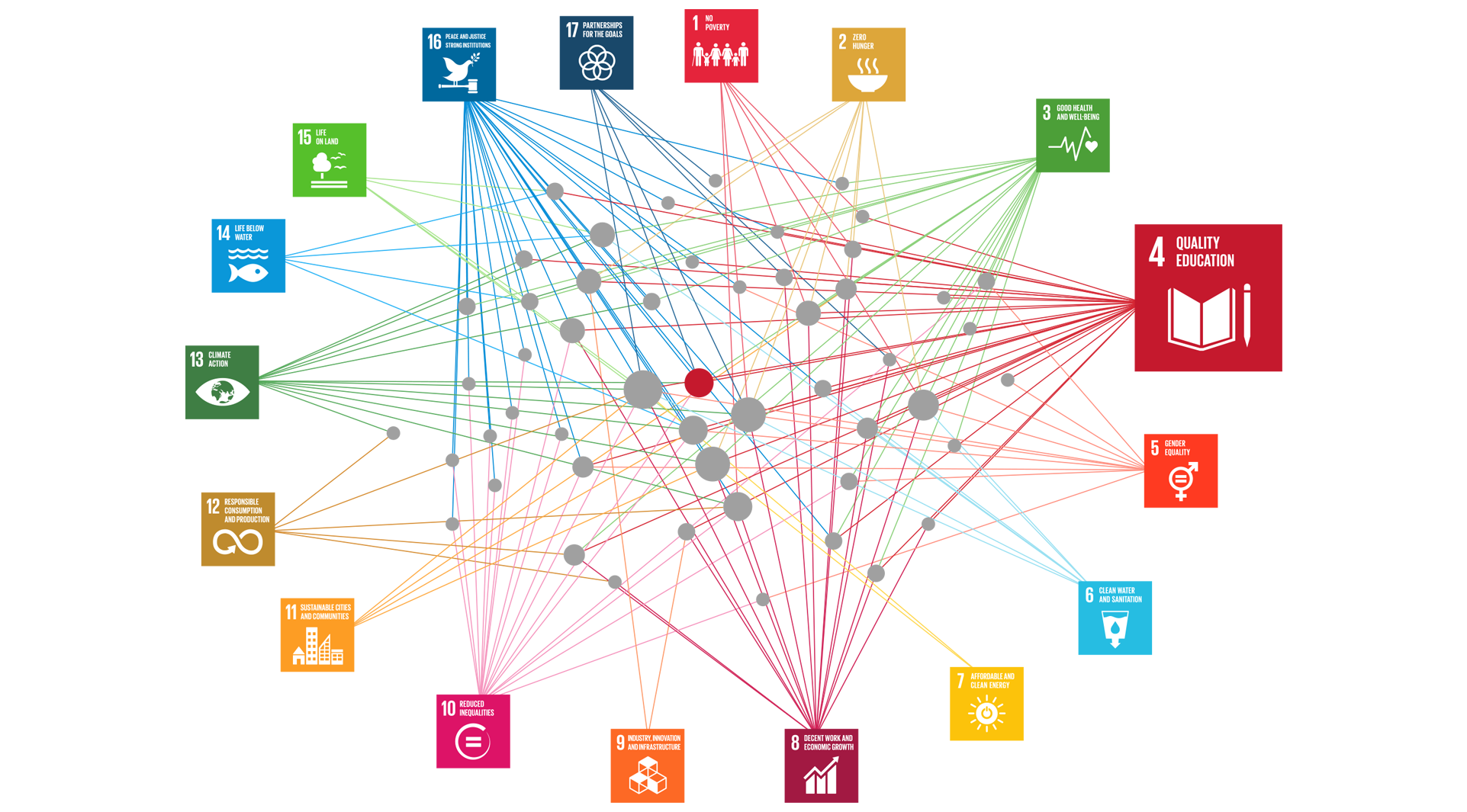Event Highlights: Complex Interlinkages between the SDGs
On 23 March 2023, the hybrid “Complex Interlinkages between the SDGs” took place online and in-person, at the Maison de la paix, Geneva Graduate Institute. Around 40 people attended the event in person and 310 registered for online attendance. The event was organised in partnership with the Centre for International Environmental Studies, the Global Health Centre and the Swiss Lab for Sustainable Finance.
The goal of the event was to examine the complex linkages between several SDGs, and explore how systems insights and practices can be more effectively leveraged for the common good to counteract negative global trends and harness positive developments, particularly with regard to governance, financing, and cooperation across several SDGs.
Taking Complexity Seriously when Examining the Interlinkages between SDGs
Mauricio Barahona, Professor at the Department of Mathematics at Imperial College London, opened the event by presenting the project he conducted with Felix Laumann, PhD Candidate at Imperial College London. Mauricio explained the difference between a complicated and complex system, which he defined as a system that can generate emergent behaviours, is contextual and non-linear. Their project included analysing data from 400 indicators for the 17 Sustainable Development Goals (SDGs) and data on global tempratures. The output was a network representation which captures whether interlinkages exist between SDGs and what the strength of these links are.
Felix further explained that their analysis constructed networks of SDGs interlinkages for 35 country groupings. They found that different connections arise based on which country grouping is taken into consideration. For instance, SDG 4 (quality education) is more central to the networkd of SDG connecitons in the Global South than the Global North. The most relevant SDGs that appear across all country groupings are SDG 11 (sustainable cities and communities), SDG 17 (means of implementation) and the temperature variable. Felix stressed that these results show global data and expertise should be coupled with local knowledge and the importance of conducting research beyond the broad goals alone to the level of specific indicators as well.
Financing for Sustainability
Nathan Sussman, Professor of International Economics and Director of the Centre for Finance and Development, explained that the SDGs require significant investments, but financing is readily available. He stressed the need to couple indicators on financial depth and development with financial resources to contribute towards sustainable development. To mobilise these resources, investments should be phased, concentrating first on priority SDGs and then move on to structural ones, also considering that investment in one set of SDGs will also influence others that are connected.
The Promise and Pitfalls of Intersectoriality
Moira V. Faul, NORRAG’s Executive Director, presented the International Geneva project, which aims to understand system practices within International Geneva. The analysis found three critical shifts happening in the Geneva ecosystem: localisation, diversification and fragmentation and decentralisation. Moira identified three pathways for change: re-orienting governance to facilitate collaboration, linking SDGs and strengthening collaboration among organisations working towards them and ensuring that International Geneva listens the Global South. Moira stressed that systems approaches need to be at the core of sustainable development to bring about meaningful change.
Embracing complexity and systems-thinking for long-term sustainability
Özge Aydogan, Director of the SDG Lab, pointed to the importance of collaborating towards long term sustainable development and understanding how already implemented practices could be improved. Overcoming sector-specific thinking within international organisations and embracing complexity can significantly increase the potential for change. Finally, Özge stressed that system design should be rooted in shared values and understandings.
After this reflection, the speakers, discussant and audience members engaged in an interactive Q&A session.
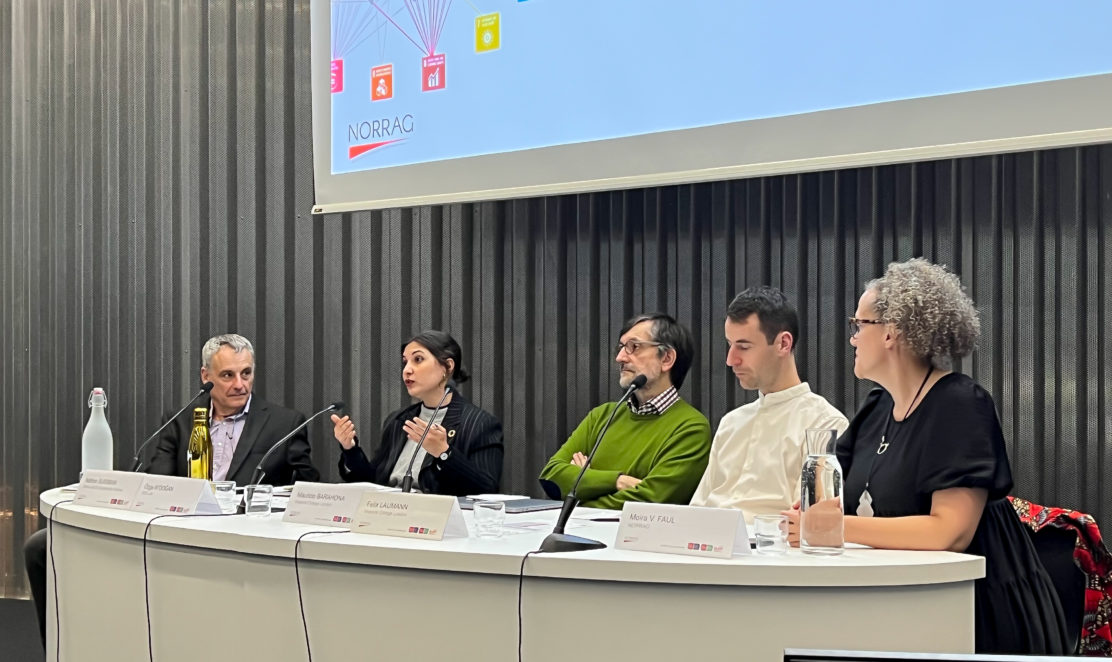
Other NORRAG projects connected to this theme include: The knowledge equity campaign #TheSouthAlsoKnows aims to reverse the North-to-South flow of expertise and decision making.The campaign aims to create a megaphone to amplify under-represented expert knowledge from the South to audiences globally, including in the North. Additionally, NORRAG contributed to the growing academic field of systems thinking for sustainable development with the open-access book Systems Thinking in International Education and Development, which is the fourth volume in the NORRAG Series in International Education and Development.
NORRAG seeks to deepen the interactions between its members through its network. As a member of NORRAG you can find and connect with any of our 5,600 other members based on shared expertise, geography or interests. Forging these connections inside the NORRAG network opens up opportunities for you to discuss and work with others who share your values and interests. Becoming a member also allows you to receive regular updates of NORRAG’s activities, events and latest publications, as well as publicising your events and news through us. Anyone interested in international policies and cooperation in education can be part of the “NORRAG community”, by attending events or consulting our Open Access knowledge products (blog, NORRAG Special Issue etc.) and our website.
Speakers
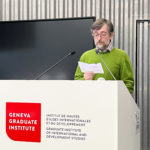 Mauricio Barahona, Imperial College London – Guest Speaker
Mauricio Barahona, Imperial College London – Guest Speaker
Mauricio Barahona is the a Professor in the Department of Mathematics at the Faculty of Natural Sciences of Imperial College London. He is also the Chair in Biomathematics. He holds a PhD in Theoretical Physics (Dynamical Systems) from the Massachusetts Institute of Technology (MIT).
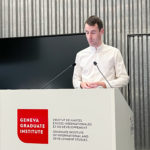
Felix Laumann, Imperial College London – Guest Speaker
Felix Laumann is a PhD student at the Department of Mathematics at Imperial College London, investigating the causal interlinkages amongst the United Nations’ Sustainable Development Goals.
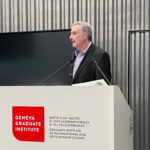
Nathan Sussman, Centre for Finance and Development – Speaker
Nathan Sussman is Full Professor of International Economics and Director of the Institute’s Centre for Finance and Development. His fields of expertise are monetary and financial economic history. He has written numerous articles and co-authored a book on emerging markets and financial globalisation.
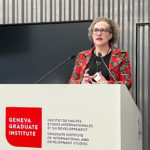
Moira V. Faul, NORRAG – Speaker
Dr Moira V. Faul joined NORRAG as Executive Director in April 2020. She has published widely on education and international cooperation. In addition, she has produced many important studies for international organizations, including the Global Partnership for Education, the UK government, UNESCO, UNHCR, and ActionAid.
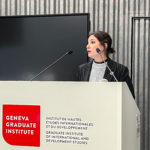
Özge Aydogan, SDG Lab – Speaker
Özge Aydogan, is the Director of the SDG Lab at the United Nations Office at Geneva. She has over 13 years of experience as an international development professional, working across the humanitarian-development spectrum in and with the UN system, international financial institutions, multilateral development banks, the Swiss Government, and research institutions.
Organising partners
Centre for Finance and Development – Website
 The Centre for Finance and Development (CFD) is an ambitious, collaborative research hub and a leading international and interdisciplinary exchange platform in finance and development-related topics.
The Centre for Finance and Development (CFD) is an ambitious, collaborative research hub and a leading international and interdisciplinary exchange platform in finance and development-related topics.
Centre for International Environmental Studies – Website
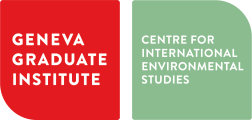 Established in 2010, the Centre for International Environmental Studies (CIES) is the Geneva Graduate Institute’s focal point for research on environmental issues.
Established in 2010, the Centre for International Environmental Studies (CIES) is the Geneva Graduate Institute’s focal point for research on environmental issues.
The Centre is dedicated to a better understanding of the social, economic and political facets of global problems related to the environment.
Global Health Centre – Website
 The Global Health Centre provides a better understanding of the shifting power balance in global health. Since 2008, the Centre has contributed to the capacity building of decision-makers, government representatives, international organisations and other stakeholders.
The Global Health Centre provides a better understanding of the shifting power balance in global health. Since 2008, the Centre has contributed to the capacity building of decision-makers, government representatives, international organisations and other stakeholders.

